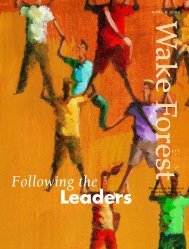Wake Forest Magazine September 2003 - Past Issues - Wake Forest ...
Wake Forest Magazine September 2003 - Past Issues - Wake Forest ...
Wake Forest Magazine September 2003 - Past Issues - Wake Forest ...
You also want an ePaper? Increase the reach of your titles
YUMPU automatically turns print PDFs into web optimized ePapers that Google loves.
LASSNOTESTaking a standIn January 1958, Lonnie Revels (’58) had found a new homeat <strong>Wake</strong> <strong>Forest</strong> University. But when the home he had leftcame under attack, Revels knew he had to leave <strong>Wake</strong> <strong>Forest</strong>to do what was right—even if that meant never coming back.The Ku Klux Klan was descending on Robeson County, thepredominantly Native American county in North Carolinawhere Revels grew up. Angered by a marriage between aNative American woman and a white man, the Klan announcedplans to intimidate Robeson County’s Lumbee Indians—andperhaps do even worse.Revels, a Lumbee and just the second minority studentever admitted to <strong>Wake</strong> <strong>Forest</strong>, got a call that he was needed.The Lumbee leadership didn’t want a fight, he said, but theyweren’t going to be terrorized in their own homes.So on the night of January 18,Revels and hundreds of otherNative Americans took a stand. Armed with shotguns andrifles, they confronted the Klansmen as they rallied around awooden cross.The Lumbees shot out the spotlights and chargedthe outnumbered Klansmen, who quickly scattered. No onewas hurt in the brief skirmish, and the Klan never returned toRobeson County.Revels worried that his participation would get back to<strong>Wake</strong> <strong>Forest</strong> officials and end his academic career, which hesaw as his ticket out of the poverty and discrimination he hadfaced growing up. “I thought I was going to get thrown out,”Revels said nearly a half-century later. “But everyone congratulatedme.” He graduated later that year.LONNIE REVELS (’58)The late Lonnie Revels (’58),a Native American activistand trailblazer, never turned his back on a challenge.By Bruce Buchanan (’93)The showdown with the Klan would have been a crowningachievement for many people. But for Lonnie Revels, whodied in Greensboro, North Carolina, on July 10, it wouldn’tbe the last—or the first—time he would be a trailblazer. Inhis sixty-seven years, Revels was a successful business owner, aGreen Beret, a civil rights advocate, and the first NativeAmerican to ever serve on Greensboro’s City Council.Revels grew up in one of America’s most segregated countiesduring the 1940s and ’50s.Whites, blacks, and Indianseach lived in their own separate, but hardly equal, society. “Wehad three water fountains, six bathrooms, three entrances tothe movies,” Revels said in an interview shortly before hisdeath. “We rode school buses an hour and a half to get awayfrom each other.”At restaurants, Revels and other Lumbees had to orderfood through the take-out window since they weren’t allowedto go inside. In school, Revels never had a textbook that hadn’tbeen used for several years in the white schools. “It wasembarrassing and insulting,” he said.What’s more, Revels thought the whole system was wastefuland impractical. Robeson County was perhaps the poorestcounty in North Carolina at the time, yet it spent untoldamounts of money to support separate school systems and therest of the infrastructure needed to maintain segregation.Revels grew up thinking that Robeson County would be a betterplace for everyone if it pulled together. He decided that hewould help change things for the better.56 <strong>Wake</strong> <strong>Forest</strong> <strong>Magazine</strong>
















